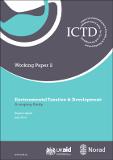Environmental Taxation and Development: A Scoping Study
Abstract
Developing countries face increasing environmental pressures across a range of dimensions. At the same time, the capacity of these governments to effectively pursue policy goals is often constrained by a lack of resources, with tax revenues in many countries being half of what is common in developed economies. For some, these are distinct issues that should be considered separately. For others, they can and should be dealt with together. This paper reviews the potential of one type of mechanism to address both goals simultaneously: environmental taxation.
After distinguishing between different forms, the paper uses a Pigouvian framework to organise and analyse theoretical and empirical evidence on the impacts of environmental taxes in developing countries. Despite limited evidence it is possible to draw some conclusions. First, taxes that are carefully designed and reflect local conditions can be effective in achieving environmental goals, and may be the best instruments under some conditions. Second, while it is possible to raise significant revenues, there may be less potential than is often supposed: environmental goals are more likely to be achieved where tax revenues are used, in part, to further the same ends; it may also be necessary – and desirable – to use some revenue to offset regressive effects; also, support for environmental taxes is likely to be undermined if they are seen to be revenue raising tools. More broadly, limits to the effectiveness of environmental taxes become more severe as the number of policy goals increases: achieving ‘double-dividends’ may be hard, and ‘triple-dividends’ harder still. A more realistic aim, therefore, may be a ‘one and a half’ dividend approach, with the environmental goal being the primary focus. Third, regardless of the quality of design, environmental taxes may fail without strong, high-level political support, particularly where they conflict with other policy goals that do have this support.
In the light of this analysis, the penultimate section of the paper develops a decision-making framework, designed to help policy-makers weigh the merits of environmental taxes to achieve specified goals. The paper concludes with a comprehensive research agenda.

